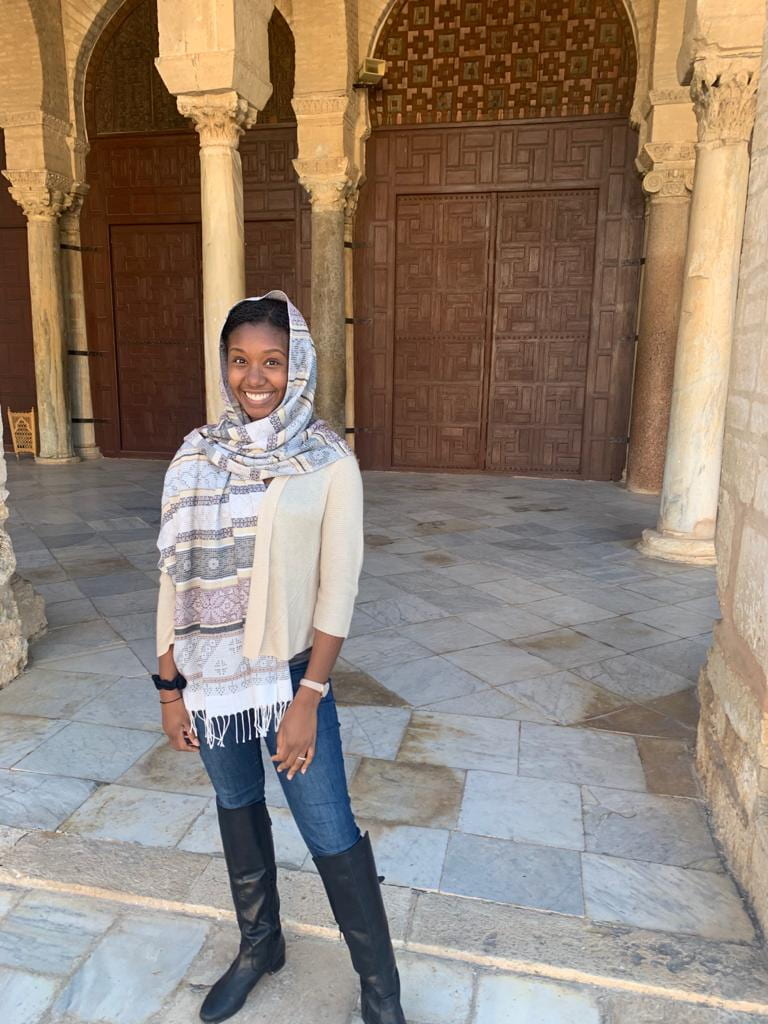Marian Tower Scholarship recipient Nia Kamau ’22 applied her award to study abroad in Morocco. In her words, she reflects what she learned and experienced studying abroad.
 Why did you select this program for your study abroad experience?
Why did you select this program for your study abroad experience?
As an Arabic student, I have always been interested in Morocco as a country with a rich Islamic, Arab heritage. In addition to wanting an opportunity to practice my Arabic, I was interested in comparing the political states of Morocco and Tunisia as one of the few countries in the Middle East/North Africa region to have achieved stability after the Arab Springs.
What was a typical day like for you?
Every day students and faculty would share breakfast together, which was often followed by a lecture. Afterward, we would spend the day visiting important cultural sites, such as the Hasan II Mosque, or visiting with local leaders, such as a diplomat or the CEO of an entrepreneurship incubator. In the afternoon we were often given the opportunity to explore on our own the markets and “medinas” (old cities). In the evenings, we would have a lecture or meet with speakers over dinner, such as a local imam or human rights commissioner.
What is one lesson you took away from your time there?
During my time in Morocco and Tunisia, our class studied the democratization processes both countries experienced after the Arab Spring and compared it to the processes of less successful states, such as Algeria and Libya. I learned that while it is essential for the US to support the advancement of democracy abroad, our actions should be in conjunction with local actors. Grassroots movements have often been more successful at democratizing their nations than when the US tries forcing and manipulating countries to accept democracy. However, these grassroots movements often do not have the resources to simultaneously balance the restructuring of the government and managing other important elements, such as the economy. These are areas where I learned the US can help support democracy, by supporting the local actors as they progress through the democratization process through their own leadership.
How has this experience influenced your goals for the future?
Before this trip, I had never seriously considered pursuing a career in diplomacy. However, after visiting with multiple diplomats in Casablanca, Rabat, Tunis, Paris, and Marseille, I became fascinated with their work, particularly those assigned to political, cultural, and human rights work. I was especially interested in the unique local programming diplomats lead to promote peace and US values abroad, such as hosting coffee chats for high-risk youth and leading cultural centers. It was also interesting to learn how different diplomats could be assigned a variety of different focus areas over their years of service and the unique challenge of adapting to different assignments. I never knew there was so much diversity within the responsibilities of the State Department and I realized how much the roles align with my personal interest in advancing American values, interacting with different people across the globe, and problem-solving through new challenges.
 How has this experience enhanced your study of Public Policy & International Affairs (PPIA), or vice versa, how has PPIA enhanced your experience abroad?
How has this experience enhanced your study of Public Policy & International Affairs (PPIA), or vice versa, how has PPIA enhanced your experience abroad?
Visiting multiple embassies and consulates opened my eyes to what working in International Affairs looks like on a day to day basis. I learned about the various responsibilities of foreign service workers, such as running cultural centers, addressing human rights issues, managing economic relations, and of course supporting Americans living within the country. This experience made the study of public policy and international affairs real to me. The theories that we learn in class actually have real impacts on people’s lives and there are many ways that the work of the State Department can not only advance American interests but also benefit the countries we work in.
